
The House of Schulenburg is the name of an old German noble family that goes back to 13th century. Members of the family held the title of Imperial Count. They had multiple political and military roles in the history of Germany and Great Britain.

The House of Schulenburg is the name of an old German noble family that goes back to 13th century. Members of the family held the title of Imperial Count. They had multiple political and military roles in the history of Germany and Great Britain.
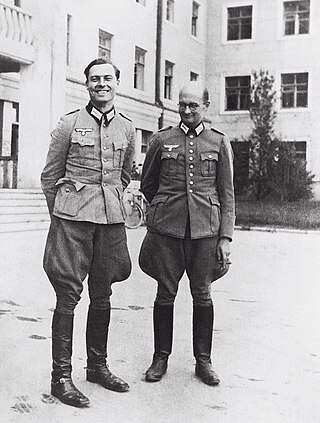
Claus von Stauffenberg was a German army officer who is best known for his failed attempt on 20 July 1944 to assassinate Adolf Hitler at the Wolf's Lair.

The 20 July plot was a failed attempt to assassinate Adolf Hitler, the chancellor and leader of Nazi Germany, and overthrow the Nazi regime on 20 July 1944. The plotters were part of the German resistance, mainly composed of Wehrmacht officers. The leader of the conspiracy, Claus von Stauffenberg, tried to kill Hitler by detonating an explosive hidden in a briefcase. However, due to the location of the bomb at the time of detonation, the blast only dealt Hitler minor injuries. The planners' subsequent coup attempt also failed and resulted in a purge of the Wehrmacht.

Berthold Alfred Maria Schenk Graf von Stauffenberg was a German aristocrat and lawyer who was a key conspirator in the plot to assassinate Adolf Hitler on 20 July 1944, alongside his younger brother, Colonel Claus Schenk Graf von Stauffenberg. After the plot failed, Berthold was tried and executed by the Nazi regime.

Obergruppenführer was a paramilitary rank in Nazi Germany that was first created in 1932 as a rank of the Sturmabteilung (SA) and adopted by the Schutzstaffel (SS) one year later. Until April 1942, it was the highest commissioned SS rank after only Reichsführer-SS. Translated as "senior group leader", the rank of Obergruppenführer was senior to Gruppenführer. A similarly named rank of Untergruppenführer existed in the SA from 1929 to 1930 and as a title until 1933. In April 1942, the new rank of SS-Oberst-Gruppenführer was created which was above Obergruppenführer and below Reichsführer-SS.

Ehrengard Melusine von der Schulenburg, suo jureDuchess of Kendal, suo jureDuchess of Munster was a longtime mistress to King George I of Great Britain.
The Schwarze Kapelle was a term used by the Gestapo to refer to a group of conspirators in Nazi Germany, including many senior officers in the Wehrmacht, who plotted to overthrow Adolf Hitler. Unlike the Rote Kapelle, the name given by the Gestapo to the Soviet spy network in the Third Reich, many members of the Black Orchestra were of aristocratic background, felt contempt for the ideology of the Nazi Party, and were politically close to the Western Allies.

The People's Court was a Sondergericht of Nazi Germany, set up outside the operations of the constitutional frame of law. Its headquarters were originally located in the former Prussian House of Lords in Berlin, later moved to the former Königliches Wilhelms-Gymnasium at Bellevuestrasse 15 in Potsdamer Platz.

The Order of the Black Eagle was the highest order of chivalry in the Kingdom of Prussia. The order was founded on 17 January 1701 by Elector Friedrich III of Brandenburg. In his Dutch exile after World War I, deposed Emperor Wilhelm II continued to award the order to his family. He made his second wife, Princess Hermine Reuss of Greiz, a Lady in the Order of the Black Eagle.

The Federal Foreign Office, abbreviated AA, is the foreign ministry of the Federal Republic of Germany, a federal agency responsible for both the country's foreign policy and its relationship with the European Union. It is a cabinet-level ministry. Since December 2021, Annalena Baerbock has served as Foreign Minister, succeeding Heiko Maas. The primary seat of the ministry is at the Werderscher Markt square in the Mitte district, the historic centre of Berlin.
Hans-Jürgen Graf von Blumenthal was a German aristocrat and Army officer in the Second World War who was executed by the Nazi régime for his role in the 20 July plot to assassinate Adolf Hitler.
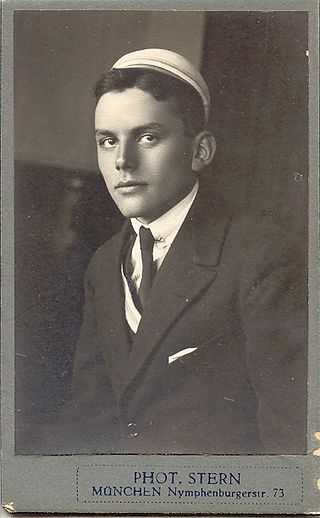
Eduard Robert Wolfgang Brücklmeier was a German diplomat and resistance fighter against the Nazi régime, who was executed as a result of his association with the 20 July Plot.

Friedrich-Werner Erdmann Matthias Johann Bernhard Erich Graf von der Schulenburg was a German diplomat who served as the last German ambassador to the Soviet Union before Operation Barbarossa, the German attack on the Soviet Union in 1941, during World War II. He began his diplomatic career before World War I, serving as consul and ambassador in several countries.

Fritz-Dietlof Graf von der Schulenburg was a German government official and a member of the German Resistance in the 20 July Plot against Adolf Hitler.
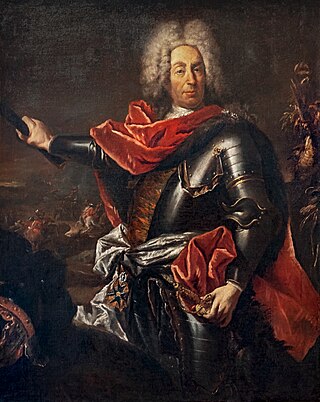
Marshal Johann Matthias Reichsgraf von der Schulenburg was a German aristocrat and general of Brandenburg-Prussian background who served in the Saxon and Venetian armies in the early 18th century and found a second career in retirement in Venice, as a grand collector and patron. His sister was Melusine von der Schulenburg, Duchess of Kendal. His father was Gustavus Adolphus, Baron von der Schulenburg.

Wilhelm, Count of Schaumburg-Lippe-Bückeburg, born Friedrich Wilhelm Ernst Graf zu Schaumburg-Lippe-Bückeburg, was a German ruler of the County of Schaumburg-Lippe-Bückeburg, an important military commander in the Seven Years' War, Generalfeldzeugmeister of the Electorate of Brunswick-Lüneburg, a British field marshal (Generalfeldmarschall) and the grandson of George I of Great Britain.

Plötzensee Prison is a men's prison in the Charlottenburg-Nord locality of Berlin with a capacity for 577 prisoners, operated by the State of Berlin judicial administration. The detention centre established in 1868 has a long history; it became notorious during the Nazi era as one of the main sites of capital punishment, where about 3,000 inmates were executed. Famous inmates include East Germany's last communist leader Egon Krenz.
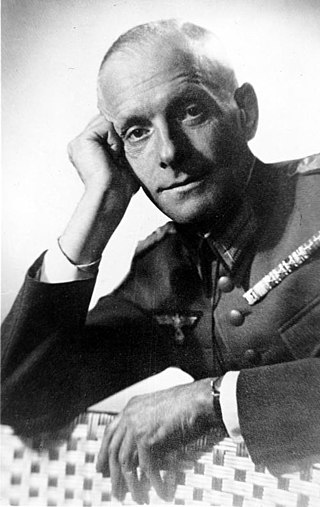
The Oster Conspiracy of 1938 was a proposed plan to overthrow German Führer Adolf Hitler and the Nazi regime if Germany went to war with Czechoslovakia over the Sudetenland. It was led by Generalmajor Hans Oster, deputy head of the Abwehr, and other high-ranking conservatives within the Wehrmacht who opposed the regime for behavior that was threatening to bring Germany into a war that they believed it was not ready to fight. They planned to overthrow Hitler and the Nazi regime through a storming of the Reich Chancellery by forces loyal to the plot to take control of the government, who would either arrest or assassinate Hitler, and restore the Monarchy under Prince Wilhelm of Prussia, the grandson of Wilhelm II.
Events in the year 1944 in Germany.
Friedrich Bernhard Karl Gustav Ulrich Erich Graf von der Schulenburg was a Prussian General during World War I and a member of the Nazi Party during the inter-war period.
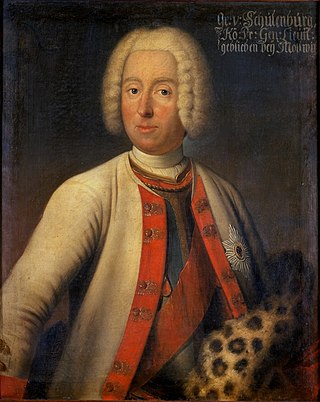
Count Adolph Friedrich von der Schulenburg was a Prussian Lieutenant General and confidant of King Frederick William I who fell in the Battle of Mollwitz during the First Silesian War.